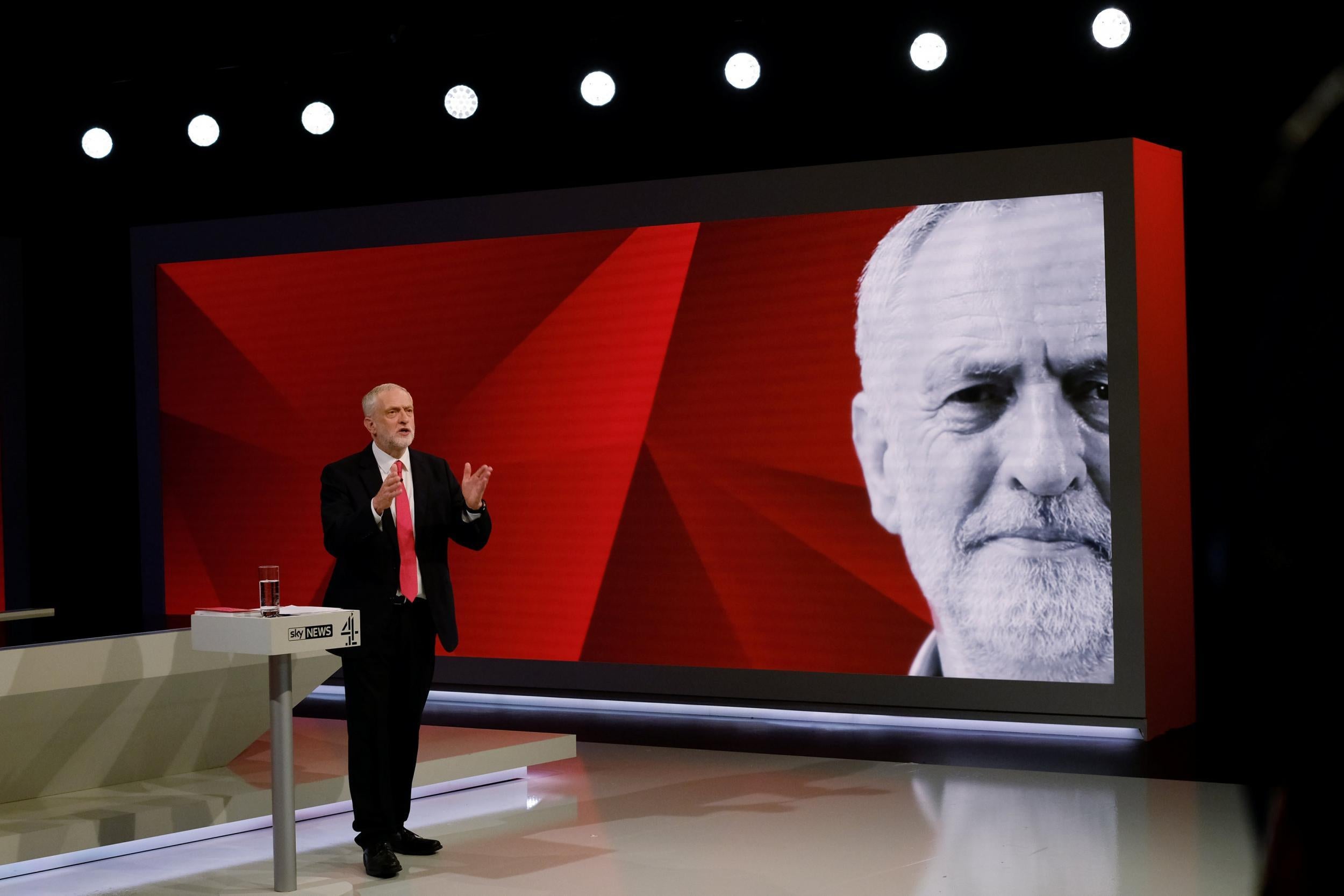If Labour continues to surge in the polls there’s no way Blairites can oust Corbyn – even if he loses
Corbyn will emerge from the election as strengthened in defeat as May will be weakened in victory


If enduring one scoreless draw over 90 minutes seemed a misfortune, sitting through two of them felt more like a bank holiday curse.
The problem with the non-debate debate styled The Battle for Number Ten is that it gave no hint of a result. The Wembley playoff final between Huddersfield and Reading was as tedious as Theresa May on triple valium. But at least, after a sterile extra 30 minutes, it ended with the clarity of a penalty shootout. In an ideal world, the “Battle” would have had an equally definitive tie-breaker, without the torture of extra time, better suited to one or both contestants wearing high heels. An arm-wrestling contest would have done nicely. (For the record, I’d have made May the 8/11 favourite, with Corbyn at evens).
Of course, in that ideal world they’d have debated each other, rather than the audience and Jeremy Paxman. May’s yellow streak dictated the separate rings format responsible for one of those hard to score bouts which viewers judge entirely according to pre-existing preference.

But while unlikely to change the election’s trajectory, it was far from irrelevant. Expectations play a major role in all electoral politics, which is why politicians try so hard to lower them. With this election, however, the candidates’ ability or otherwise to match and exceed expectations might be more crucial to them personally than the headline result.
By that criterion, Jeremy Corbyn won the battle by appearing sane, chilled and empathetic, and is on course to win an election he is numerically almost certain to lose. Theresa May lost it by playing defence (did she ever park that bus) to avoid catastrophic howlers, and will probably be the election loser despite winning a decent majority.
A couple of weeks ago, with still stratospheric approval ratings, she was expected to annihilate Labour so absolutely that its existence would be threatened. Today, the polls – I know, I know, but what else can we go by? – show the gap narrowing as Labour surges into the mid-high 30s. If they are right, and if he sustains his progress – a second colossal “if”. even before today’s vagueness on Woman’s Hour – Corbyn could well exceed Tony Blair’s 35.2 per cent vote share in 2005.
If so, and recalling that Blair felt perfectly entitled to carry on, it will be fun listening to the laureates of whining entitledness known as the Blairites explain why Corbyn must resign forthwith.
Under no circumstances would he or should he quit in that event. Even 32 per cent would be a clear improvement on both Ed Miliband and Gordon Brown, allowing him to argue that he is leading the party in the right direction.
If he does a little better than that, and if Labour loses few enough seats to keep the Tory majority well below 100, he will achieve more than the right to survive. He would emerge from the election as strengthened in defeat as May would be weakened in victory. Given the expectations of a month ago, a Conservative majority as high as 80 would represent one of the more pyrrhic wins in general election history.
But which particular general election does this one resemble most closely? When it was called, the obvious template was 1983, when a female Tory PM fought a post-Falklands nationalistic campaign against a likeable, principled but hopelessly dishevelled CND-supporting old leftie, Michael Foot, and destroyed him.
When this startling Labour revival began, it started to look more like 1987, when Tory complacency and the improved performance of another leftie, Neil Kinnock, slashed Thatcher’s lead. A week before polling day, such was the Tory panic on “Wobbly Thursday” that Lord Young grabbed Norman Tebbit and screamed “We’re going to lose this f****** election”. They didn’t. They retained a three figure majority. But Kinnock, who beat expectations with a slick campaign, carried on.
Now an earlier election flits into the acute mind of the commentator and novelist Robert Harris. “May reminiscent of Heath in 74,” he tweets. “Called an opportunistic election when far ahead in polls & then campaign unravelled under scrutiny.”
In another age of disunity and strife (industrial then rather than European), Edward Heath begged for a decisive mandate by asking the country “Who governs Britain?”. The country’s reply was “Not you”.
The last time May reminded anyone of him was moments before the Budget. Her Heathian shoulder-shaking laugh looked like hubristic smugness, and so it proved when the self-employed national insurance hike self-detonated within days.
That U-turn, which took her marginally longer to execute than her “dementia tax” reversal, set the tone for Paxo’s depiction of her as “a blowhard who collapses at the first sign of gunfire”. With the Home Counties champ blowing harder than ever and the plucky underdog from Islington gaining strength, the least interesting election in memory has morphed into one of the most captivating. The contrast between May’s palpable punchiness and Corbyn’s zen-like assurance raises doubts that were unimaginable a fortnight ago. It would still be a miracle should the Tories fail to win, if not well enough to finish off Corbyn or safeguard May’s position for long.
But for those who like omens, Huddersfield won that penalty shootout from as hopeless a position as the one from which lifelong fan Harold Wilson, the town’s most famous son, beat Ted Heath by a whisker in 1974.
Join our commenting forum
Join thought-provoking conversations, follow other Independent readers and see their replies
Comments
Bookmark popover
Removed from bookmarks